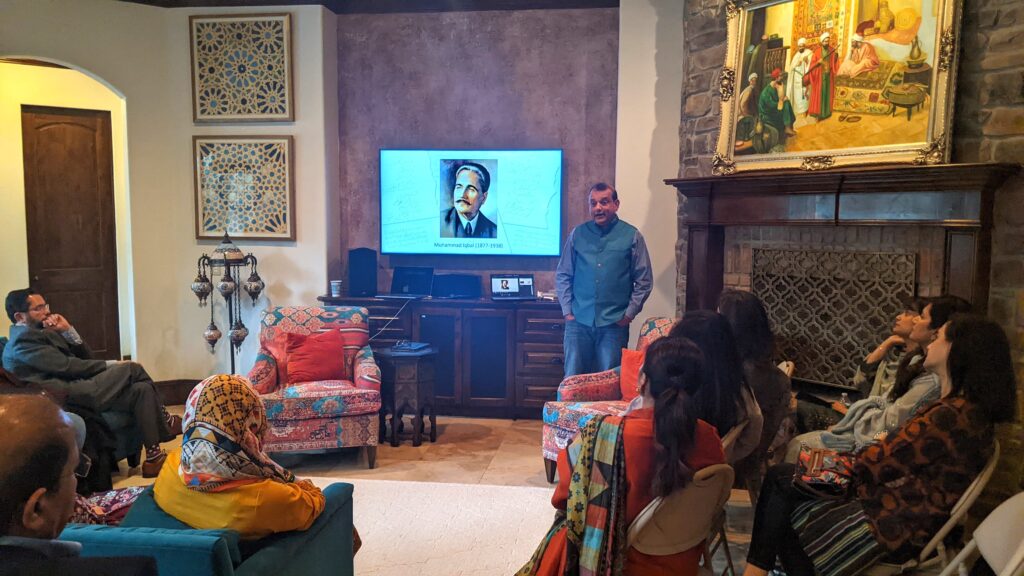by Aneeq Ejaz

On 28th January 2023, Dr. Syed Akbar Hyder, Associate Professor at the Department of Asian Studies, delivered a talk titled “Revisiting Iqbal, The Cosmopolitan”, focusing on the text and context of the Javid Nama (“Book of Eternity”), a towering work of poetry by the most important Perso-Urdu poet of the twentieth century, Muhammad Iqbal.
The talk was convened by Dr. Azfar Moin, Chair of the Department of Religious Studies, as part of an initiative for public engagement and fundraising. The session was hosted by Dr. Arif Abdullah, a Pakistani-American physician, in The Woodlands, TX and was attended by members of The Woodlands’ Pakistani community.
Reflecting on the relevance and influence of Iqbal in contemporary South Asia, Dr. Hyder noted that during his primary school days in India, he learned Iqbal’s patriotic song Sāre jahān se achā, Hindustān hamārā (“Better than the entire world, is our Hindustan”) before he had the occasion to learn the Indian national anthem. Even today, he added, Iqbal tends to feature in every conversation that revolves around history, philosophy, poetry or religion in circles as varied as that of nationalists, feminists, mystics and evangelists.
After outlining Iqbal’s early education and influences—especially the figures of Syed Mir Hassan (Iqbal’s teacher from Sialkot and a master instructor of Arabic, Quranic studies and Sufism) and Daagh Dehalvi, a noted Urdu poet with whom Iqbal corresponded through letters—Dr. Hyder argued that these influences helped shape Iqbal’s intellect and inculcated in him a cosmopolitan personality that was at home with the diversity and contradictions of the world, a tendency that reflects in his work through the concept of harjāi.

Before Iqbal picked it up, the term harjāi carried the connotations of a “vagabond”, a “street walker”, someone “untrustworthy”, and someone existing in every place. It is this latter sense of harjāi that Iqbal expanded upon as he developed, according to Dr. Hyder, “a striking vision of global cosmopolitanism” characterized by a space of playfulness where one can co-exist with contradictions without demanding exclusive loyalty.
The second major point of Dr. Hyder’s discussion was Iqbal’s idea of khudi. Before Iqbal, khudi was a term used in Sufi circles to denote “selfishness” or “ego”, something that the practices of mysticism were meant to extinguish. Iqbal adopted this term and imbued it with a whole new meaning, where khudi came to encompass a tripartite connotation of ishq (love), ilm (knowledge) and amal (action), all of it coming from the space of harjāi and playfulness. It becomes a call to fashion a dynamic self that can accommodate contradictions and does not appeal to consistency. In so doing, khudi paves the way for the emergence of a community that “rises above superficial political and religious divisions” and is rooted in dialogue. This notion of khudi became the cornerstone of Iqbal’s poetry and remains, according to Dr. Hyder, one of the most important philosophical concepts of the twentieth century, earning Iqbal the title “Poet of the East”.
Further points of discussion by Dr. Hyder included the formal aspects of the Javid Nama, Iqbal’s idea of Prophethood and his stance on minorities. The talk was followed by a Q&A session in which Dr. Hyder addressed the charge that Iqbal’s work is contradictory and contextualized the reception of Iqbal’s work by the modern nation-states of India and Pakistan, both of which seek to erase the multiplicity inherent in Iqbal’s thought.

